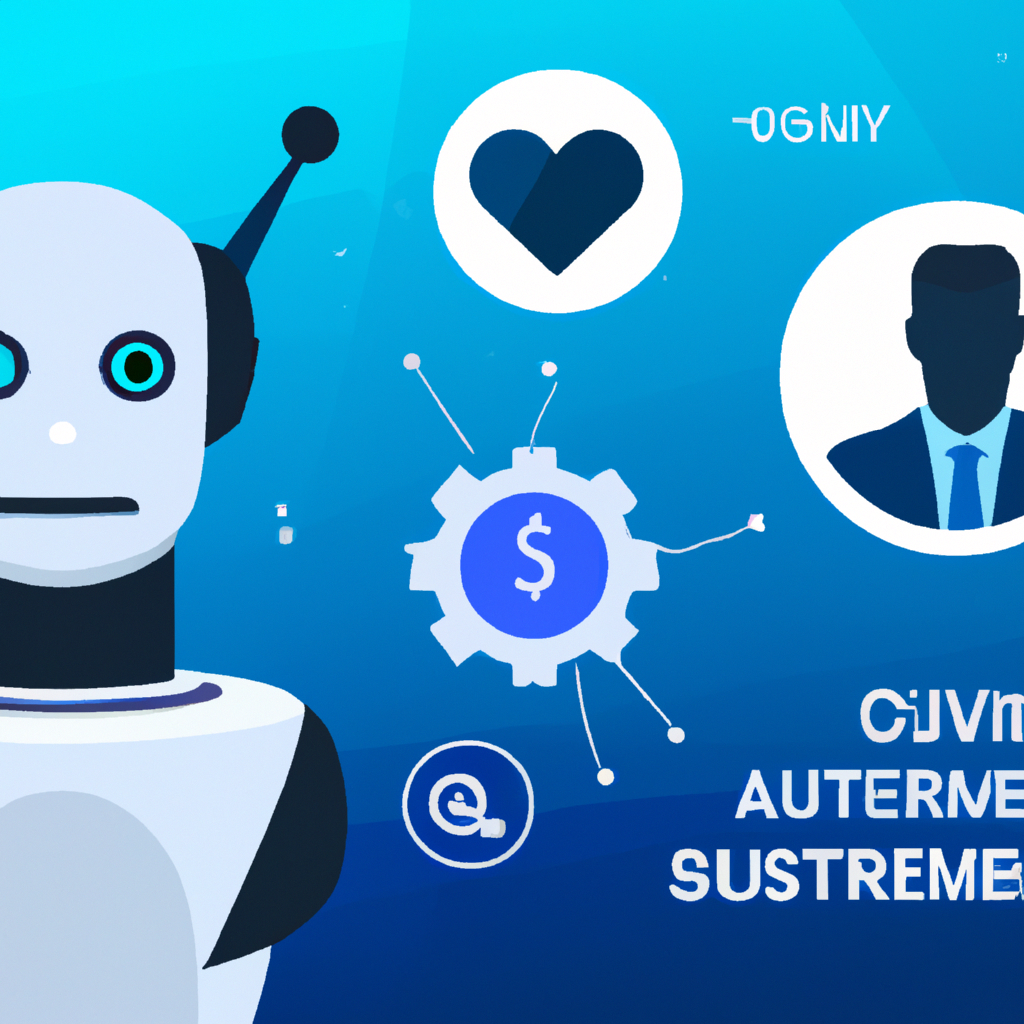-
Table of Contents
with AI-Powered Customer Service.
Introduction
The use of Artificial Intelligence (AI) in customer service is revolutionizing the way businesses interact with their customers. AI-powered customer service solutions are helping companies to provide a more personalized and efficient customer experience, while also improving customer retention. AI-driven customer service solutions are able to automate mundane tasks, such as responding to customer inquiries, and provide more accurate and timely responses. AI-driven customer service solutions can also provide customers with more personalized recommendations and services, helping to increase customer satisfaction and loyalty. AI-driven customer service solutions are also helping companies to better understand their customers, allowing them to better tailor their services and products to meet customer needs. By leveraging AI-driven customer service solutions, businesses can improve customer experience and retention, while also reducing costs and increasing efficiency.
How AI is Transforming Customer Service: Benefits and Challenges
AI is transforming customer service in a big way. From chatbots to virtual assistants, AI is making customer service faster, more efficient, and more personalized. But with any new technology, there are both benefits and challenges. Let’s take a look at how AI is transforming customer service and the advantages and disadvantages that come with it.
The Benefits of AI in Customer Service
One of the biggest benefits of AI in customer service is that it can provide faster and more efficient service. AI-powered chatbots can quickly answer customer questions and provide helpful information. This can help reduce wait times and improve customer satisfaction.
AI can also provide more personalized service. AI-powered chatbots can learn from customer interactions and provide more tailored responses. This can help customers feel more valued and appreciated.
Finally, AI can help reduce costs. AI-powered chatbots can handle many customer service tasks, which can help reduce the need for human customer service agents. This can help businesses save money on labor costs.
The Challenges of AI in Customer Service
One of the biggest challenges of AI in customer service is that it can be difficult to get right. AI-powered chatbots need to be programmed correctly in order to provide accurate and helpful responses. If the chatbot is not programmed correctly, it can lead to customer frustration and dissatisfaction.
Another challenge is that AI-powered chatbots can’t always provide the same level of service as a human customer service agent. AI-powered chatbots can’t always provide the same level of empathy and understanding as a human customer service agent. This can lead to customer dissatisfaction.
Finally, AI-powered chatbots can be expensive to implement and maintain. Businesses need to invest in the technology and resources needed to create and maintain an AI-powered chatbot. This can be a significant cost for businesses.
Conclusion
AI is transforming customer service in a big way. From chatbots to virtual assistants, AI is making customer service faster, more efficient, and more personalized. But with any new technology, there are both benefits and challenges. Businesses need to weigh the advantages and disadvantages of AI in customer service before investing in the technology.
Leveraging AI to Improve Customer Service Efficiency
AI is revolutionizing customer service, making it more efficient and effective than ever before. AI-powered customer service solutions are helping businesses provide better customer experiences, reduce costs, and improve customer satisfaction.
AI-powered customer service solutions use natural language processing (NLP) to understand customer queries and provide accurate, personalized responses. AI-powered chatbots can quickly respond to customer inquiries, freeing up customer service agents to focus on more complex tasks. AI-powered customer service solutions can also be used to automate mundane tasks, such as data entry and customer segmentation.
AI-powered customer service solutions can also be used to analyze customer data and provide insights into customer behavior. This data can be used to improve customer service processes and create more personalized experiences. AI-powered customer service solutions can also be used to identify customer trends and anticipate customer needs.
AI-powered customer service solutions can also be used to automate customer service processes. Automation can help reduce costs and improve customer service efficiency. AI-powered customer service solutions can also be used to automate customer service tasks, such as ticketing and order processing.
AI-powered customer service solutions are revolutionizing the way businesses interact with their customers. By leveraging AI, businesses can provide better customer experiences, reduce costs, and improve customer satisfaction.
The Impact of AI on Customer Service Quality
The impact of artificial intelligence (AI) on customer service quality is undeniable. AI has revolutionized the way businesses interact with their customers, providing a more personalized and efficient experience. AI-powered customer service solutions are becoming increasingly popular, as they can provide a more accurate and efficient response to customer inquiries.
AI-powered customer service solutions use natural language processing (NLP) to understand customer inquiries and provide accurate responses. This technology can be used to automate customer service tasks, such as responding to frequently asked questions or providing personalized recommendations. AI-powered customer service solutions can also be used to analyze customer feedback and provide insights into customer satisfaction.
AI-powered customer service solutions can also be used to provide a more personalized experience. AI-powered chatbots can be used to provide personalized recommendations and advice to customers. AI-powered customer service solutions can also be used to provide personalized product recommendations and discounts.
AI-powered customer service solutions can also be used to improve customer service quality. AI-powered customer service solutions can be used to analyze customer feedback and provide insights into customer satisfaction. AI-powered customer service solutions can also be used to identify customer service issues and provide solutions to improve customer service quality.
Overall, AI-powered customer service solutions can provide a more personalized and efficient experience for customers. AI-powered customer service solutions can also be used to analyze customer feedback and provide insights into customer satisfaction. AI-powered customer service solutions can also be used to identify customer service issues and provide solutions to improve customer service quality. AI-powered customer service solutions can help businesses provide a better customer experience and improve customer service quality.
Automating Customer Service with AI: Pros and Cons
AI-powered customer service is becoming increasingly popular as businesses look for ways to improve customer experience and reduce costs. While AI can offer many advantages, it also has some drawbacks that should be considered before implementing it.
Pros
1. Increased Efficiency: AI-powered customer service can help businesses respond to customer inquiries faster and more accurately. AI-based chatbots can quickly answer common questions and provide customers with the information they need. This can help reduce wait times and improve customer satisfaction.
2. Cost Savings: AI-powered customer service can help businesses save money by reducing the need for human customer service agents. This can help businesses reduce labor costs and free up resources for other areas of the business.
3. Improved Accuracy: AI-powered customer service can help businesses provide more accurate responses to customer inquiries. AI-based chatbots can quickly analyze customer data and provide more accurate answers than human customer service agents.
Cons
1. Limited Capabilities: AI-powered customer service is still limited in its capabilities. AI-based chatbots can only answer basic questions and may not be able to provide more complex answers. This can lead to customer frustration and dissatisfaction.
2. Lack of Human Interaction: AI-powered customer service can lack the human touch that customers often crave. Customers may prefer to speak to a human customer service agent who can provide more personalized service.
3. Security Risks: AI-powered customer service can also pose security risks. AI-based chatbots can be vulnerable to hacking and other malicious activities. Businesses should take steps to ensure their AI-powered customer service is secure.
Overall, AI-powered customer service can offer many advantages, but businesses should consider the potential drawbacks before implementing it. By weighing the pros and cons, businesses can make an informed decision about whether AI-powered customer service is right for them.
AI-Powered Chatbots: Enhancing Customer Service Interactions
AI-powered chatbots are revolutionizing customer service interactions, making them faster, more efficient, and more personalized. By leveraging the power of artificial intelligence, chatbots are able to understand customer queries and provide accurate, timely responses.
Chatbots are able to provide customers with a more personalized experience by understanding their individual needs and preferences. For example, a chatbot can remember a customer’s past interactions and use that information to provide more tailored responses. This can help customers feel more valued and appreciated, leading to increased customer satisfaction.
Chatbots can also help reduce customer service costs by automating routine tasks. By taking over mundane tasks such as answering frequently asked questions, chatbots can free up customer service agents to focus on more complex tasks. This can help reduce wait times and improve customer service efficiency.
Finally, AI-powered chatbots can help improve customer service by providing real-time feedback. By analyzing customer conversations, chatbots can identify areas of improvement and provide actionable insights to customer service agents. This can help customer service teams better understand customer needs and provide more effective solutions.
Overall, AI-powered chatbots are transforming customer service interactions, making them faster, more efficient, and more personalized. By leveraging the power of artificial intelligence, chatbots can help improve customer satisfaction, reduce customer service costs, and provide real-time feedback.
Conclusion
AI and customer service have the potential to revolutionize the customer experience and retention. AI-driven customer service solutions can provide customers with personalized, efficient, and accurate service, while also reducing costs and improving customer satisfaction. AI can also help companies better understand customer needs and preferences, allowing them to tailor their services to meet those needs. By leveraging AI, companies can create a more engaging and satisfying customer experience, leading to increased customer loyalty and retention.




